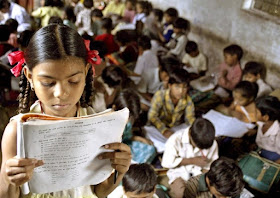English privilege. We grew up with it. With a much-coveted Convent education, jokes mocking those who spoke ‘broken’ English were too common. ‘On the light’ Ha ha! That’s ‘PUT on the light, or SWITCH on the light!’ ‘I’ll tell to Miss that you are teasing me!” “That’s ‘I’ll TELL Miss’, not ‘tell TO’! Gosh!” But practically everyone in school spoke ‘broken’ English at the beginning, because it was their second language. They came as little four year olds from homes where Marathi or Hindi was spoken, and were whipped (not literally) into English fluency through twelve years at an English medium school.
But I grew up in a home where English WAS our first language, and we prided ourselves on speaking English as well as (or better than) the British. It was a very desired skill. In a culture of humiliation, there was always something for fellow students to put others (and teachers too) down for, accents, ignorance, body size and shape, but mockery for imperfect English was pretty common. I don’t remember any incidents very clearly, but I know I subconsciously felt I was better than other people because I spoke better English, because that was the message I received from the world.
As I grew up I realized it wasn’t just school. Being fluent in English changed everything, opened doors that would have otherwise remained closed, gave us opportunities that most people didn’t have. Fluent English speakers have an edge on the job market, can grasp study material easily, present themselves better, and sound more intelligent and educated. Even socially, fluent English-speakers often band together, and often exclude people who didn't fit in that narrow social class. I've often heard young people talk about 'the wrong kind of crowd', and they're not talking about their morals, but their social class, their culture, and yes, their English. I've seen the divide even in our church community.
I realized as I worked with the underprivileged that the things that came so easily to me didn’t come as easily to everyone else. I could walk into a church or school office, approach someone in authority, and quickly win trust or at least lessen suspicion, and often get the help I needed by fluently and convincingly explaining myself. Even if I wore clothes that were not expensive or ‘upper class’, (in fact I more often look like a college student, with jeans and backpack), my English would convince people that I was someone of importance, someone they probably shouldn’t ignore. Basically, English has snob value.
Of course now there are a lot of people in India who have felt the sting for too long, and are turning the tables, with anger against anyone who is not fluent with the local language. English is simultaneously connected with snob value and an inferiority complex, not surprisingly since it came with the British and their class system and superior attitude towards the ‘natives’.
Still, 70 years later, fluency in English in India is usually equated with intelligence, education, ability, position, trustworthiness, status and often value. I only re-examined these assumptions as an adult, and realized that they were faulty. Slowly over the years I have tried to root out these lies and re-align my mind and behaviour with the truth. What is the truth?
1. English is just a language, a skill. It does not reflect character, intelligence or value.
2. As a language, it is for communication, not a status symbol. If someone with ‘broken’ English can communicate a thought, instruction or idea, then they have successfully used the language as a means to an end.
3. Someone who speaks several languages imperfectly is far more skilled and laudable than someone who speaks ONLY English perfectly (for example, I).
4. But a person’s skills in language or lack thereof can never detract or add to his or her value. Everyone deserves to be treated with the same respect and consideration.
5. Because society at large gives me a privilege and advantage that I don’t deserve, I am responsible for using that privilege for the sake of those who have been deprived of it. ‘From everyone to whom much has been given, much will be required.’
6. English DOES open doors, especially in getting jobs, and a higher education, so whenever possible I should help people pick up that skill.
7. Reading books, articles and blogs, and watching movies and documentaries in English have given me a glimpse of a world outside of my small world, and that is a good thing. Once again, it is a good reason to help especially students with English.
8. The class (and caste) system is so ingrained in people’s minds, that I need to go out of my way to show and remind people that we are equal, that we are brothers and sisters, no matter our background, privilege or social status. Whenever possible, I need to choose the discomfort of speaking the language I am uncomfortable with in order to allow others to speak the language they are comfortable with.
This is one of the most beautiful and enlightening aspects of Christianity. Unfortunately too many Christians have ignored the truth and teachings of Christ and stuck to the status quo, because it protects their privilege. It’s time for us to make a change.



